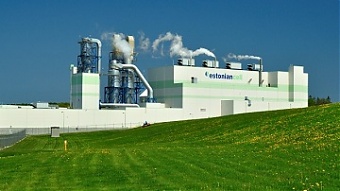Estonia, Good for Business, Industry, Investments, Markets and Companies
International Internet Magazine. Baltic States news & analytics
Wednesday, 31.12.2025, 21:26
Estonian Cell completes EUR 20 mln investment in Kunda
 Print version
Print version |
|---|
Estonian Cell installed the last devices relating to
the growth investment program in June. The program will increase the company's
production capacity to 185,000 tons a year and will decrease the impact on the
environment. The company started up the new equipment across the last quarter
and the facility was opened on Wednesday.
"With this project, we built a new aerobic wastewater
treatment plant that uses a new technology, which will able us to direct even
cleaner wastewater into the sea and use significantly less electricity," Estonian
Cell board member Lauri Raid said.
"The rest of the investments we made for expanding or
replacing the aspen pulp manufacturing technology so that we can produce aspen
pulp with less chemical and energy expenses. From this year we will also
increase our production capacity by 10%," he said.
The main technology suppliers were Hager+Elsasser, Valmet,
and Andritz.
In 2018, the production capacity of Estonian Cell was
165,000 tons of aspen pulp, and all of the plant's output was exported. In
2018, total sales amounted to 90.5 mln euros.
Alfred Heinzel, one of the owners of Estonian Cell,
said that during the 13 years that the company has been in business they have
invested 50 mln euros in addition to the original investment of 153 mln euros.
"When establishing the plant with the best possible
technology in Estonia, I very much believed in Estonia's competitiveness in
raising foreign investments. Unfortunately, Estonia's competitiveness in
raising foreign investments decreased immediately after the launch of the
Estonian Cell plant in 2006, which has limited new growth investments in our
Estonian plant," Heinzel said. He said that because of that, they have
carried out their large-scale projects -- three modern paper manufacturing
machines with a total cost of 380 mln euros -- in Austria, a country with lower
energy prices and better predictability of political decisions.
Last year, the Estonian government decided to lower the
energy excise duties for energy-intensive industries.
"I have stuck by my word and, as a response to the
excise reduction, invested the promised amount of 20 mln euros. With this we
made the first step towards eliminating bottlenecks in production volumes, but
also improving environment-related activity. In order to go on with
investments, however, we need energy taxes that are more competitive still and
more stable political decisions for the growth of industry," Heinzel said.
The previous Estonian government introduced a tax incentive
for high energy intensity businesses according to which an electricity excise
duty rate of 0.5 euros instead of the regular rate of 4.47 euro applies to
Estonian Cell from the beginning of this year.
The government is considering expanding the circle of
businesses eligible for the reduced tax rate and has agreed about completing a
relevant analysis by February 2020.
Estonian Cell's aspen pulp mill in Kunda launched
production in 2006. With 205 mln euros, the facility boasts one of the biggest
foreign greenfield investments made in Estonia over the last decade. The
company employs 90 people directly and generates work for around 500 employees
within its value chain. The company produces high-quality
chemi-thermomechanical aspen pulp that is fully exported to countries in Europe
and Asia.
The sole owner of Estonian Cell is Heinzel Holding
GmbH, a leading producer of market pulp and packaging papers from Austria.








 «The Baltic Course» Is Sold and Stays in Business!
«The Baltic Course» Is Sold and Stays in Business!

